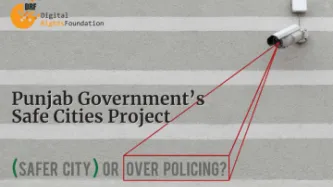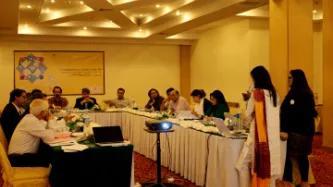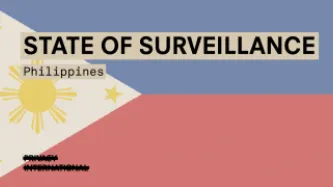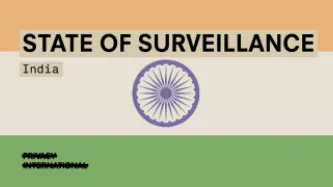Search
Content type: News & Analysis
According to the International Organization for Migration, an estimated 258 million people are international migrants – that is, someone who changes their country of usual residence, That’s one in every 30 people on earth.
These unprecedented movements levels show no sign of slowing down. It is predicted that by 2050, there will be 450 million migrants across the world.
Nowadays, it is politically acceptable to demonise migrants, and countless leaders have spewed divisive and xenophobic…
Content type: Long Read
The idea of a “smart city” is primarily a marketing concept, used to sell data-intensive technologies under the pretext of improving the functioning of cities. This could include injecting ‘smart’ tech into delivering services, public safety, environmental monitoring, traffic control, among other possible applications.
One in particular aspect of smart cities has been consistently problematic: how these projects are used to boost law enforcement and policing under the guise of public safety.…
Content type: News & Analysis
By Digital Rights Foundation, Pakistan
What is a safe city?
The answer to this question is not uniform; in fact it varies according to who you ask.
In a focus group conducted by Digital Rights Foundation in May of last year, consisting of women rights activists from across Pakistan, the answer meant imagining a city that was not only safe for women, in terms of their physical safety, but also welcoming for women and non-binary individuals in its architecture and facilities. Women expressed…
Content type: News & Analysis
Written by the Foundation for Media Alternatives
7:01: Naomi wakes up and gets ready for the day.
7:58: Naomi books an Uber ride to Bonifacio Global City (BGC), where she has a meeting. She pays with her credit card. While Naomi is waiting for her Uber, she googles restaurant options for her dinner meeting in Ortigas.
9:00: While her Uber ride is stuck in traffic on EDSA (a limited access highway circling Manilla), Naomi’s phone automatically connects to the free WiFi offered by the…
Content type: Press release
The European Court of Human Rights will hear a landmark case on surveillance tomorrow (7 November) as part of a challenge to the lawfulness of the UK’s surveillance laws and its intelligence agencies’ mass surveillance practices.
See the attached briefing for case background and historical information.
The case, described by campaigners as a “watershed moment for people’s privacy and freedom of expression across the world”, is being brought by Amnesty International, Liberty, Privacy…
Content type: News & Analysis
The much maligned Prevention of Electronic Crimes Bill (PECB) was dealt a critical blow by senior Senate members on Tuesday in Pakistan. Digital Rights Foundation, in conjunction with Bolo Bhi, held a consultation for members of the Pakistan Senate, other lawmakers, members of civil society, and the media.
The aim of the consultation was to discuss the Bill, the problematic provisions and amendments that have been suggested in its most recent version, and the steps…
Content type: News & Analysis
The National Privacy Commission has had to firefight a huge leak of voter data in Philippines just one month before the elections
Raymund Liboro, the Philippines’ National Privacy Commissioner, has had a tough few weeks. Barely has his office even existed -- he was appointed in March -- than it is having to firefight what is being reported as the country’s most massive data breach to date. On 27 March, a hacker broke in to the national Commission on Elections (Comelec)’s…
Content type: Long Read
This guest piece was written by Jessamine Pacis of the Foundation for Media Alternatives. It does not necessarily reflect the views or position of Privacy International.
Introduction
With a history immersed in years of colonialism and tainted by martial law, Philippine society is no stranger to surveillance. Even now, tales of past regimes tracking their citizens’ every move find their way into people’s everyday conversations. This, for the most part, has kept Filipinos…
Content type: Long Read
Written by: Centre for Internet and Society
This guest piece was written by representatives of the Centre for Internet and Society (CIS). It does not necessarily reflect the views or position of Privacy International.
Introduction
As part of the State of the Surveillance project, CIS conducted a review of surveillance law, policy, projects, and trends in India. Below we provide a snap shot of key legal provisions governing surveillance in India and touch on…
Content type: News & Analysis
Every government seems to want to spy in Pakistan. The US' National Security Agency (NSA) tapped the fibre optic cables landing in Karachi, among others, and used 55 million phone records harvested from Pakistani telecommunications providers for an analysis exercise. The United Kingdom's Government Communications Headquarters (GCHQ) had a store of SIM keys from Mobilink and Telenor networks, two of the country's biggest providers.
But the Pakistani government, specifically the…
Content type: News & Analysis
PI spent the first half of February in Asia, visiting our regional partners and speaking at events. Our trip began in Delhi, where the Centre for Internet and Society (in collaboration with the Society in Action Group) had organized two consecutive privacy conferences – an invite-only conclave on Friday 3rd February and a free symposium open to the public on Saturday 4th February. The conclave consisted of two panels, the first focusing on the relationship between national security…
Content type: News & Analysis
Nigel Waters has previously represented Privacy International at APEC Data Privacy Subgroup meetings, on one occasion with PI having official guest status, otherwise indirectly through membership of the Australian delegation. On this occasion, expenses were paid by USAid for participation in the technical assistance seminar, and this allowed attendance at the other meetings.
Cross border privacy rules
As a reminder, or for newcomers, the cross border privacy rules (CBPR) system is one…










